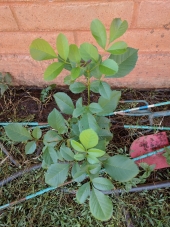I came across a youtube video entitled "Regenerative Agriculture - Eric Toensmeier"
Toensmeier starts talking about Mark Shepard's Restoration Agriculture system at about 31.5 minutes. He has plenty of praise but also an erroneous complaint, "...a marvelous, marvelous effort. Some of the numbers in his book are totally wrong...um, inaccurate or making the wrong comparison between his systems and corn production. He does not get more calories per acre than corn, although he claims that he does. I'm hoping he's maybe just bad at math."
I gather Toensmeier is just bad at reading comprehension. Shepard did not make the simplistic, easily-disprovable claim that his system beats corn in calories per acre.
On p.154 Shepard writes, "Corn yields are impressive- massive, actually. ...one acre of average fertility crop land planted in corn can produce around 13.9 million calories of food energy. That's a
lot of food." On p.180, the total calories per acre on Shepards farm is listed as just under 6 million calories per acre. He never makes the ridiculous claim that 6 million > 13.9 million.
Shepard's claim is more nuanced and far more important- it's not about quantity of industrial raw ingredients produced per acre, it's about producing large quantities of quality human food.
p.155 "...monocrop systems of annual grains do not have enough
nutrition in order to feed people."
He goes on to point out that people don't eat much of that corn, you can't survive on corn alone, and the livestock that we do eat don't make very efficient use of those calories. So to make an apples-to-apples comparison between corn farming and restoration agriculture, the 13.9 million calories is whittled down to 3.06 million calories per acre.
(see attached scans)
I suppose the whittlin' down to 3.06 million might be debatable, but it's completely disingenuous to claim that Shepard said anything like, "In absolute terms, with some added pigs, trees, etc. I can grow more calories than a corn farmer."











